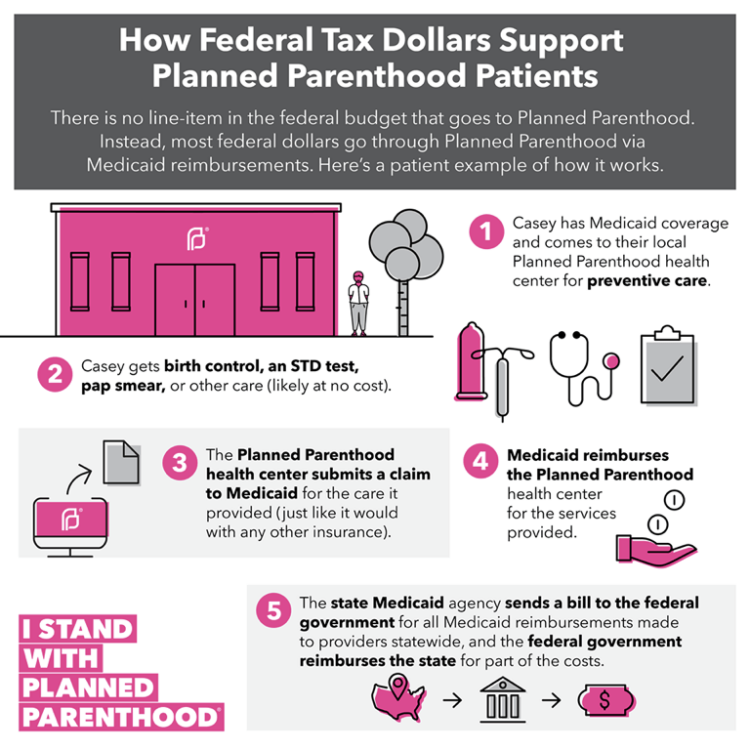
[Photo via Planned Parenthood Action]
Paul Ryan and the Republican-controlled Congress are trying again to defund Planned Parenthood, only this time — with President-elect Trump at the helm — they just might succeed. Republicans have gone after Planned Parenthood for a long time, solely because they provide abortion care (despite the fact that Federal Funds do not cover abortion care). These politicians are imposing their religious beliefs on people across the US – ironic, given that this country was founded on the separation of church and state.
The defunding of Planned Parenthood will not stop abortions. Women (1 in 3) will still attempt to access that care, but it will become more expensive, much more time-consuming, and potentially less safe than it is now. In addition, millions of people – who use Planned Parenthood to fulfill their health needs – will be left without an affordable health care option for preventive and regular care like pap smears, breast exams, birth control or STD testing. In fact, many Americans — particularly working class and low-income people — rely on the health care they receive at Planned Parenthood, and they will now be scrambling to figure out what to do because of the GOP.
We asked our favorite feminists to tell us what Planned Parenthood means to them.
Sa’yida Shabazz: “Planned Parenthood saved me more than once. When I was younger, I didn’t have insurance and I was able to get coverage thanks to their help. I was able to get a pregnancy test there when I didn’t have a regular doctor. I will probably be going back now that I don’t have insurance again. They do so much good, and it’s not fair that this is happening.”
Rowan Beckett Grigsby: “I got my first IUD at Planned Parenthood. The one in my neighborhood has a cop out front and screens you as you walk in, in case you’re going to blow the place up. They talked to me like I was a human being with my own thoughts and feelings. There’s no real way to describe how rare that is, when it hasn’t been the way you move in the world. It’s the first place I wasn’t told ‘your husband will change your mind’ when I said I didn’t want children. It’s kind of a funny story — I was really poor and I could barely afford an IUD but it’s still the most cost-effective and, you know, actually effective method of birth control. But when you don’t have a lot of money you can’t always front the cost for a thing that pays off over time. The nurse heard the hesitation in my voice and told me if I didn’t mind having someone who was being trained in the room, I could have my birth control for a lot cheaper as part of her training. When the day came it was kind of like a party in the room — we were cracking jokes and holy crap there were a lot of people between my knees. Everyone was happy for me. I think that’s the thing that sticks with me the most: I was a person, and they were happy for me that I was able to have control over my future.”
Sara Habein: “A lack of Planned Parenthood access makes it even harder for my trans friends to receive care. Our local clinic is one of few in the state of Montana that provide hormone prescriptions for trans patients, and people rely on that access. Our local PP is also active about giving high school students accurate information about sexual health and safety through their Teen Council program, and I would hate to see that cut. Planned Parenthood provides a wealth of services that are absolutely vital to this country’s citizens.
J.M. Reed: “As a restaurant employee through my 20s and part of my 30s, Planned Parenthood was often the only healthcare I could afford. PP helped me with everything from Premenstrual Dysphoric Disorder to yeast infections, UTIs, and even a kidney infection.
When I think of women not having access to this support and healthcare that’s so badly needed, I feel physically ill. Along with my friends and fellow community members, I worry about the younger generations as they age up in a society with an extremely uncertain future of healthcare (and no hope in the short term), and the cliché, antiquated battle to legislate women’s bodies. I have been there — needing the help and the care and understanding of health care professionals when I couldn’t otherwise afford it. To think of that resource as simply gone or much less available, I feel profoundly sad for our country.
For me, Planned Parenthood has meant healing, and autonomy for myself and my body. And that is where the fear with regard to women so often exists within our culture: the autonomy. Which is why there is a threat to defund PP every few years: because so many still rabidly desire to refuse women the right to make decisions for our own bodies. Just typing that out, it still strikes me as shockingly absurd. Defunding Planned Parenthood would mean several giant steps back for us as a country and as a culture, and certainly as a leader among nations.”
Therese Shechter: “Working on my documentary “How To Lose Your Virginity,” I had hundreds (maybe thousands) of conversations with young women about becoming sexually active. I’m struck by the crucial role Planned Parenthood played in these stories, especially for women who only got Abstinence-Until-Marriage programs growing up. When their communities offered only shame and judgment, when there was no one to talk to about sex, and nowhere to go for resources for healthy sexuality, Planned Parenthood was there for them.”
Amanda Rose Adams: “Planned Parenthood meant that I was the first woman in generations to not give birth at age 19 (or younger). I paid $13 a month for birth control at Planned Parenthood when I had no health insurance and the care I received there was vastly superior to my GP [general practitioner] in high school. Instead I was able to work my way through community college and university as a woman in a steady relationship and eventually marriage. I ‘should’ be conservative because of where I live on the socioeconomic spectrum, but I am only in this place because resources like Planned Parenthood and Pell Grants made it possible for me to have both a life and a future.”
Amy Dryansky: “When I was a teenager, Planned Parenthood was the only place my friends and I knew we could get reliable, confidential and low-cost or FREE information about safe sex practices and contraception. We didn’t all take advantage of those services, but it was a huge relief to have the information, and to know contraception was available. It helped us to be able to talk about it with one another, and support each other to make smart, healthy choices, whether it was to have safe sex, or not to have sex at all. Because of PP, I’m quite sure several unplanned teen pregnancies and STDs were avoided in my age group. Multiply that by the hundreds of thousands and you have the positive impact of PP.”
Celeste Lindell: “My story isn’t dramatic, but it’s probably pretty typical of the ongoing need for Planned Parenthood. Way before the ACA, when I was in my 20s and early 30s, I worked for more than seven years at a company that didn’t offer employee benefits. Planned Parenthood was my only source of healthcare that entire time. I made just enough money that I always paid their full rates, that it was well worth it to have affordable and reliable care. With the imminent threat of the ACA repeal, people in communities with limited access to healthcare need the services of Planned Parenthood more than ever.”
Katie Klabusich: “It’s very possible that without Planned Parenthood (and the Affordable Care Act) I would be dying of cervical cancer right now. I sought care at Planned Parenthood offices in Illinois, Maryland, Brooklyn, and San Diego as I’ve had to move for job opportunities and losses. Without Planned Parenthood, I wouldn’t have had access to timely cancer screenings and follow-up care after two procedures to remove precancerous cells. Federal funds already cannot be used for abortion care; defunding Planned Parenthood is defunding life-saving, preventative care and Speaker Ryan needs to admit that he knows that people will die if he succeeds.”
Have a question for our ragtag group of raging feminists? Send it to Avital Norman Nathman at TheMamafesto@gmail.com and it might just be answered in a future Feminism 101!


Grok Nation Comment Policy
We welcome thoughtful, grokky comments—keep your negativity and spam to yourself. Please read our Comment Policy before commenting.